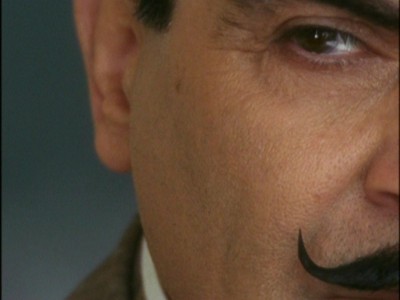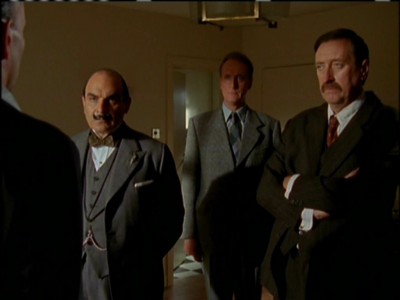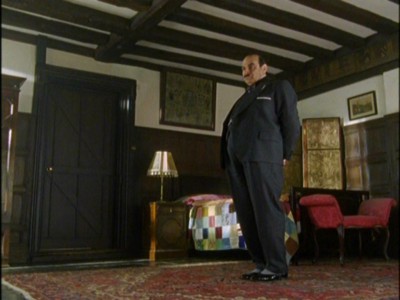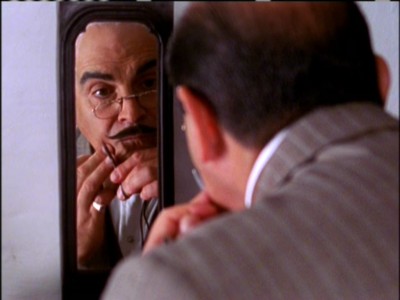| Reviews & Columns |
|
Reviews DVD TV on DVD Blu-ray 4K UHD International DVDs In Theaters Reviews by Studio Video Games Features Collector Series DVDs Easter Egg Database Interviews DVD Talk Radio Feature Articles Columns Anime Talk DVD Savant Horror DVDs The M.O.D. Squad Art House HD Talk Silent DVD
|
DVD Talk Forum |
|
|
| Resources |
|
DVD Price Search Customer Service #'s RCE Info Links |
|
Columns
|
|
|
Agatha Christie's Poirot - The Definitive Collection
"The question is: can Hercule Poirot possibly be wrong?"
"No one can always be right."
"But I am! Always I am right! It is so invariable it startles me! And now it looks very much as though I may be wrong and that upsets me. And I should not be upset because I am right. I must be right because I am never wrong!"

Well, it's hardly the "definitive" collection. A&E has yet again gone back to the Poirot well and repackaged three of their previous Hercule Poirot disc sets to come up with Agatha Christie's Poirot - The Definitive Collection, which groups together twelve of David Suchet's feature-length Poirot TV mysteries that originally aired in 2000 and onward. Titles include The Murder of Roger Ackroyd, Lord Edgware Dies, Murder in Mesopotamia, and Evil Under the Sun (all four of which were previously released on 2004's Agatha Christie Megaset Collection); Death on the Nile, Sad Cypress, The Hollow, and Five Little Pigs (all four of which were previously released on 2005's Agatha Christie: Poirot - The New Mysteries Collection); and The Mystery of the Blue Train, Taken at the Flood, After the Funeral, and Cards on the Table (all four of which were previously released on 2006's Agatha Christie: Poirot - Classic Crimes Collection). Obviously, if you already have these collections, there's no reason to double-dip on Agatha Christie's Poirot - The Definitive Collection - no additional bonuses have been added, nor have the correct widescreen transfers been utilized here. These are the same exact discs that can be found in the three previous collections. And while that title is truly misleading (not all of the feature-length Poirot films are included here, let alone the 36 hour-long episodes from the earlier seasons of the series), Agatha Christie's Poirot - The Definitive Collection is a much cheaper alternative to those first collections (isn't that annoying, previous buyers?), and an excellent place to start your TV Poirot collection.
By now, it has been fairly well established by Christie fans (as well as by TV mystery enthusiasts) that English actor David Suchet owns the character of Hercule Poirot, the bizarre Belgian private detective that became Agatha Christie's most beloved and well-known literary sleuth - a belief I share, as well. As a boy, though, my strongest visual impressions of the character came from two wildly disparate sources: Albert Finney's startling transformation as Poirot in Sidney Lumet's superior, Murder on the Orient Express (I had to be told by my parents that it was the Tom Jones actor, so complete was his alteration); and the hilariously gross, feline take by James Coco as Poirot-spoof "Milo Perrier" in Neil Simon's wonderfully non-P.C. Murder by Death ("I'm not a Frenchie! I'm a Belgie!"). But as is often the case with TV adaptations of feature films, such as with M*A*S*H or The Odd Couple, the performers lucky enough to follow through with the same character for several years on TV often eclipse in the public's mind the equally accomplished, well-regarded big-screen originators of the roles (if you ask most people whom they picture as Hawkeye and Oscar and Felix, they'll most probably say Alan Alda, Jack Klugman, and Tony Randall - not Donald Sutherland, Walter Matthau, and Jack Lemmon). And so it is with David Suchet, who is currently coming up on almost twenty years playing the fastidious, inhumanly precise, egotistical private dick (a term that Poirot, no doubt, would blanch at).
Watching Suchet all these years (I was hooked on the series right from the start, being an enthusiast - but not, certainly, an expert - in Christie), it's an almost melancholy experience to see him mature and deepen the Poirot character, to the point where in the later films, Poirot is a most solitary, at times deeply sad, figure. And all with a decreasing level of effort on Suchet's part (due to an increasing level of performing skill, no doubt). Looking over the films in Agatha Christie's Poirot - The Definitive Collection, which came a full 11 years and more after Suchet started to play the detective, a definite progression can be seen already, with Poirot becoming more isolated (sidekicks Hastings, Japp and Lemon soon disappear), more resigned to the perversities of human nature, and simply put, more lonely. The first four films in the collection find a Poirot full of almost impish delight at the prospect of solving a particularly tricky case with the (usually unneeded) aid of his cohorts. His bonhomie when Hastings and Japp return into his circle of acquaintances - even though they're plodding dolts next to the nimble mind of Poirot - lightens the films considerably, with Suchet even breaking the fourth wall at times to give us the viewers withering looks whenever Hastings says something particularly silly.

But that lightness within Poirot, detectable even beneath the innumerable small sufferings he experiences whenever the world deviates in the slightest degree from his prescribed obsessions with the correct food, the correct etiquette, or being mistaken for being...don't say it...French, slowly withers away during the course of Agatha Christie's Poirot - The Definitive Collection, leaving Poirot in a much darker world - a world I've always associated with Christie's overall view of human nature. I've never quite understood Christie's detractors who mislabel her works as "safe" or "quaint" or "reassuring" (I recently came across an interview with mystery writer P.D. James, who largely dismissed Christie with faint praise on those very grounds). Perhaps it's what we would now call in these modern times Christie's "period detail," or the sometimes ritualistic use of the more recognizable frameworks of the English village mystery (frameworks made stereotypical because she largely perfected them) that leads people to view Christie's books as appealing picturesque and comfortably old-fashioned.
However, I've always found her world rather terrifying in the endlessly recycling violence that fills the backgrounds of her seemingly "normal" environments. Christie's world is a terribly depressing, bleak place, peopled by cheaters, liars, and killers; a cold, venal, base world that Christie relentlessly uncovers with an unblinking eye. And who "saves" us, the reader (or viewer), from this desolate mess? Two outsiders - a lonely, insignificant spinster (Miss Jane Marple), and a bizarre-acting foreigner - both of whom, although sure in a higher moral order such as "justice," live out their lives separate and alone. Poirot's little obsessions with his dress, his food, and his excessive correctness and politeness, quirky little ticks that always provide solid laughs from readers and viewers, can also be seen as a rigid, last-ditch efforts by the detective to hang onto some kind of personal order, while the rest of the world spins out of control.
And it's this formalized quirkiness, coupled with Poirot's perhaps too-deep appreciation for the perversity of human nature, that makes him such a simultaneously humorous and sympathetic character, one that Suchet delineates in finer and finer detail with each TV outing. Poirot is never not amusing to watch here; the humor of the character is never let go in favor of total isolation and depression. Funny little asides and facial expressions from Suchet are too numerous to list, but some are priceless. In Evil Under the Sun (the funniest of the films here), Suchet is hilarious when, stricken with what everyone thinks was a heart attack, moans in exasperation when he receives a get-well card from Scotland Yard's forensics lab. In the same film, watch the pleasure Suchet brings to a starving Poirot, when Hastings announces that lunch is ready. In Sad Cypress, Suchet has a brilliant moment when his delicate, refined palette collides with his sleuthing; forced to test various fish paste sandwiches, a clearly shaken Poirot intones to a doubting Thomas: "No, she was murdered...but not by these disgusting sandwiches." And in Taken at the Flood, when a police inspector offers a humbug (an English peppermint candy) out of a bag, the at-first curious Poirot peers into the bag, before screwing up his face and shaking his face in minor revulsion, saying, "Non!" the flapping of his jowls clearly audible on the soundtrack. That is priceless Suchet as Poirot.
But equally strong dark influences are at work around Poirot in these films, with Suchet masterful at getting across the innate sadness of the character with just the barest, most subtle of facial expressions. While one always wonders if Suchet's Poirot, in his expressions of empathy towards potential suspects, is performing as the literary Poirot does in such circumstances (i.e.; play-acting or outright lying to get all information available about the mystery), the displays of personal regret in his dealings with people are clearly sincere. There's an arresting moment in The Hollow, following the discovery of the killer, who is also dead, where one of the previous suspects, a beautiful, young girl, asks Poirot what to do about the body. And Poirot, sadly taking in this lovely woman, mournfully intones, "Go, my child. Your place is with the living. I will remain here with the dead," as he watches her leave the scene. Poirot, by his looks, by his demeanor, and by his curse in life (his genius in seeing people for what they truly are, in all their ugliness), is set upon a course in life that will never include this beautiful, alive creature. In The Mystery of the Blue Train, as Poirot comes to delight in the education of a newly-wealthy young woman who has accepted his offer of acting as her avuncular, his disappointment and regret in the end when he realizes that she no longer wishes to travel with him, is heartbreaking as essayed by Suchet. He's served her purpose while she was fragile and learning, and now it's time to move on - which obviously hurts Poirot deeply. These and other small, painful moments register just as strongly as the openly comical ones for Suchet, giving the Poirot character a depth of feeling and emotion that builds on each subsequent outing - performances which rightfully eclipse the previous "definitive" rendition of the character by Albert Finney.

The Murder of Roger Ackroyd
Poirot's retirement in a quiet country village ends abruptly with the death of his disagreeable neighbor.
Lord Edgware Dies
Intervening in a sticky marital situation, Poirot suddenly finds himself in the midst of murder.
Murder in Mesopotamia
Poirot visits an ancient site in Iraq just before the head archeologist's unpopular wife is killed.
Evil Under the Sun
Death intrudes on Poirot's island holiday, and only he can determine who is responsible.
Death on the Nile
A pleasure cruise down the Nile turns deadly when a murder is discovered on board. Thank goodness Poirot is along for the ride.
Sad Cypress
The solution to a double-murder case appears to be cut and dry, but Poirot's impeccable instincts eventually lead him to the real truth.
The Hollow
A weekend retreat where all the guests appear to despise one another finds Poirot hard at work doing what he does best.
Five Little Pigs
Poirot agrees to help a young woman prove her mother's innocence, 14 years after being sent to the gallows.
The Mystery of the Blue Train
When the daughter of an oil magnate is found dead on the famous Blue Train to the French Riviera, Poirot must investigate the past to reveal the killer.
Taken at the Flood
Mystery surrounds a young woman after her new husband is killed in the London Blitz, and the mystery depends when a man who may be her first husband shows up dead.
After the Funeral
Following the murder of a wealthy patriarch, Poirot is called upon to begin an investigation. The case takes a wild twist, however, when his prime suspect turns up dead.
Cards on the Table
When a woman [reviewer's note: it's a man, actually] is found dead at a card game, four investigators, including Poirot himself, set out to discover which guest is the killer.

The DVD:
The Video:
No correction has been made to these transfers, the majority (if not all) of which were obviously filmed for British widescreen TV, and which appear here in U.S. full-frame, 1.33:1 transfers. From the third film on, the image clarity improves drastically, with sharpened detail, much-boosted color, and higher brightness levels. Fine grain is apparent, and a few times, jiggering cropped up, which I'm going to assume may be due to PAL conversion issues. Otherwise, these transfers (minus the annoying commercial-break fade-outs and ins) are acceptable, if unspectacular.
The Audio:
The Dolby Digital English 2.0 stereo audio mixes are uneventful, with few chances for any kind of directional effects - although all the dialogue, the most critical aspect of these films, is cleanly heard. Unfortunately, only the first three films have close-caption capabilities.
The Extras:
The extras on Agatha Christie's Poirot - The Definitive Collection are the exact same threadbare bonuses offered on the three previous collections from which this one has been culled: some lame text bios of Suchet, Christies and a handful of cast members here and there. Surely something else could have been added here to entice new buyers?
Final Thoughts:
Just like they use to say that "Sean Connery is James Bond," David Suchet is Hercule Poirot; I can't imagine anyone in the foreseeable future tackling the role. Suchet's almost-20-year reign as Agatha Christie's bizarre little Belgian private detective has provided the actor with an uncommonly long period of time to develop and hone his take on the fictional detective, and his grasp of the character in these later feature-length TV movies, is nothing short of phenomenal. Yes, the scripts are tight for the most part, the direction smooth, the production designs faultless (filled to the brim with gorgeous Art Deco wonders), and the supporting players uniformly excellent. But Suchet truly is the whole show, and his comic yet deeply sad portrayal of the lonely, egomaniacal, frustratingly obsessed, and deeply kind-hearted Hercule Poirot is the stuff of TV legend. If you already have these discs from the other collections, you needn't bother with double dipping. Newcomers, though, will find an affordable way to begin their Suchet Poirot collections, certainement. Despite the flawed transfers and zero extras, the overall quality of these mysteries trumps my reservations. I highly recommend Agatha Christie's Poirot - The Definitive Collection.
Paul Mavis is an internationally published film and television historian, a member of the Online Film Critics Society, and the author of The Espionage Filmography.


|
| Popular Reviews |
| Sponsored Links |
|
|
| Sponsored Links |
|
|
| Release List | Reviews | Shop | Newsletter | Forum | DVD Giveaways | Blu-Ray | Advertise |
|
Copyright 2024 DVDTalk.com All Rights Reserved. Legal Info, Privacy Policy, Terms of Use,
Manage Preferences,
Your Privacy Choices | |||||||













